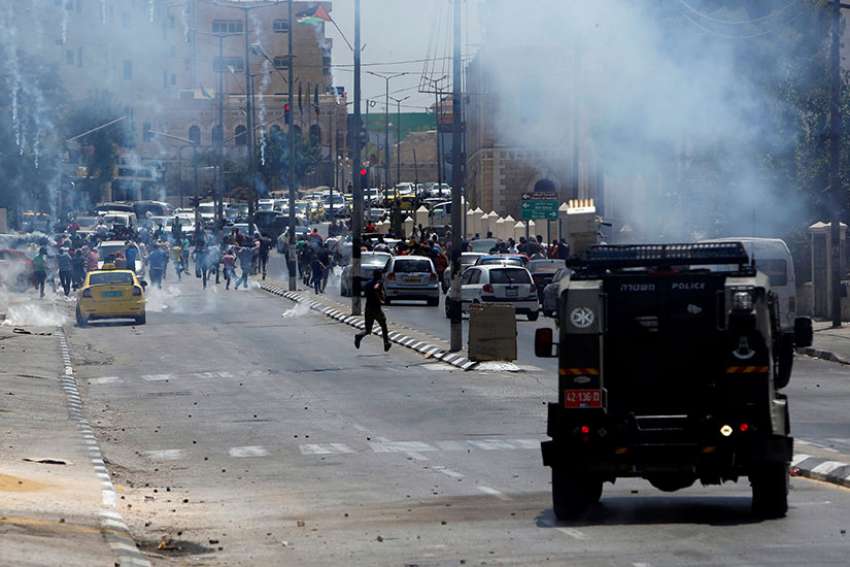Palestinian protesters run for cover from tear gas fired by Israeli troops during clashes in the West Bank city of Bethlehem.
CNS photo/Mussa Qawasma, Reuters
West Bank priests stress nonviolence as youths protest Israeli occupation
By Judith Sudilovsky, Catholic News Service
JERUSALEM – With tensions still high in the Old City following weeks of violence, Fr. Firas Aridah completed his work at the Latin Patriarchate early so he could leave Jerusalem for his West Bank parish before any possible violence began.
"There were many (Israeli) police and soldiers, closing many roads," Aridah told Catholic News Service in a phone interview once he was back in Jifna's St. Joseph Parish July 28.
Friday afternoon prayer in Muslim tradition is considered especially significant and is required of all Muslim men. Often during volatile periods, prayers at the contested Al-Aqsa Mosque compound have been followed by demonstrations. Sometimes the tensions spread to other sections of Jerusalem, or even to the West Bank.
For Aridah and other parish priests in the West Bank, the challenge is to emphasize the Christian tradition of nonviolence while supporting their young parishioners' desire to oppose the Israeli occupation.
Aridah said he counsels young people not even to throw stones at the young Israeli soldiers who sometimes come near their village on patrols or in search of men wanted by the army.
"The problem is with the (Israeli) government, not with the soldiers," he said. "Violence is not acceptable from either side. With this conflict, Israel is losing its image as a democratic state. I tell the young men that we are not with this violence. If we do not accept for Israel to behave this way, then how can we accept it from our side? Wherever God is represented in our life, we should have no violence."
If word that someone might be considering taking part in a violent demonstration reaches him, the priest makes a beeline to that home for a conversation. The way to best serve their society, he advises them, is to get an education, to bring a new vision to Palestinian life.
"I don't want to see blood in my parish," Aridah said. "If we want to see (real) results, I tell (the young people) to be educated. I (tell them) to serve your people well, do well in the university, then go get a job in society and tell the world (about our situation), but do nothing with violence. If we want to resist, we resist with education."
As he prepared to leave for a new parish in northern Israel, Aktham Hijazin of the Annunciation Parish in Beit Jala spent his last Sunday with his parish saying his good-byes. He said the majority of Palestinians, including his parishioners, are proponents of nonviolent opposition to the Israeli occupation. His parishioners did not take part in the clashes in neighboring Bethlehem, he said.
Following the tenets of their Catholic faith, he said, "They are not interested to take part in any violent act."
In Ramallah, West Bank, Fr. Ibrahim Shomali noted that though he did not take part, members of his parish as well as clergy from the Melkite and Greek Orthodox churches did participate in peaceful demonstrations in Ramallah, away from the flashpoints with Israeli soldiers.
He said he has made it clear to his parishioners that, even while under Israeli occupation, violent confrontation is not acceptable. Even if Israel settlers attack Palestinian farmers and villagers, violence is not justified, he added.
As Christians, he said, people must respect all holy places and respect the holiness of Al-Aqsa for Muslims.
"We resist with our prayers and with our Bible and with respect of the human person," Shomali said. "If you can love your enemy, you can have more power over them and get stronger to ask for your rights."
The Al-Aqsa mosque compound has been the focal point of Palestinian-Israel confrontation for decades. To Muslims it is Haram al-Sharif, or Noble Sanctuary where, according to tradition, the Prophet Muhammad ascended into heaven. To Jews it is holy as the Temple Mount, where, according to Jewish tradition, the two biblical temples stood. In the Gospels, this is where Jesus lashed out against the money-changers when he came to Jerusalem on Passover.
On July 14 outside one of the compound gates, two Israeli policemen were murdered by three men from an Israeli Arab town. The men had smuggled guns into the compound; Israeli police shot and killed them. Israel responded by erecting metal detectors and other security measures outside the compound, sparking protests — some violent — by Muslims.
A week later, a Palestinian snuck into the Israeli settlement of Halamish and killed three members of an Israeli family during their Shabbat dinner. An off-duty soldier shot and injured the attacker.
Israel eventually removed the metal detectors at the Al-Aqsa compound and replaced cameras with "smart cameras" that have face recognition capabilities and can detect weapons.
"The place is holy for the three religions, Muslims, Christians and Jews, so we should (all) be able to raise our praise to God," said a Catholic priest, who asked not to be named. "This may be possible when a peace agreement is reached."
Tagged under:
Please support The Catholic Register
Unlike many media companies, The Catholic Register has never charged readers for access to the news and information on our website. We want to keep our award-winning journalism as widely available as possible. But we need your help.
For more than 125 years, The Register has been a trusted source of faith-based journalism. By making even a small donation you help ensure our future as an important voice in the Catholic Church. If you support the mission of Catholic journalism, please donate today. Thank you.
DONATE

